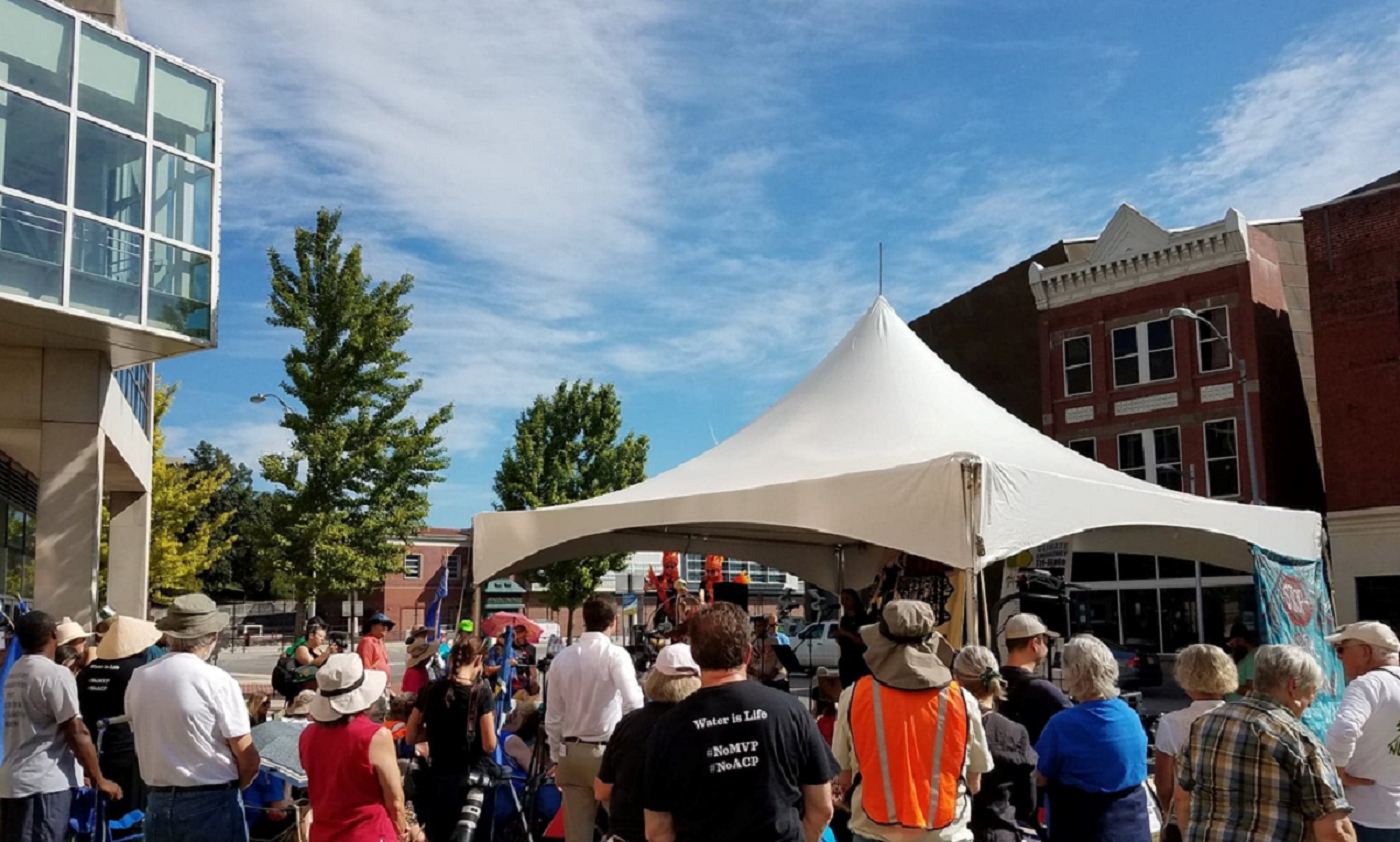More than five years of fighting the proposed dirty, dangerous fracked gas Mountain Valley Pipeline (MVP) has brought us to an important turning point. Last week hundreds turned out in a Tri-State Protest against fracked gas pipelines, showing elected officials, the public, and the utilities behind these pipelines that the opposition isn’t going anywhere. That’s why when we realized last year that they not only wanted to keep building the problematic MVP also to expand it into North Carolina, new landowners, communities, and advocates quickly joined the fight.
Since that announcement, more evidence has come out showing that gas is not cheaper than renewables. Recently the Rocky Mountain Institute found that “Continued investments in these (gas) power plants will present stranded cost risk for customers, shareholders, and society, while locking in 100 million tons of CO2 emissions each year.” Additionally, the MVP would cause property owners to lose an estimated $42.2 to $53.3 million in property value, and that's for just eight of the 17 counties crossed. Important voices have started to take a stand on these issues as well. Agencies are starting to listen to Indigenous voices. Read this inspiring piece on how "Our ancestors’ voices are begging us to stand up" by Beth Roach, a tribal councilwoman for the Nottoway Indian Tribe of Virginia, a member of the Virginia Interfaith Power & Light steering committee and a former community organizer for Mothers Out Front.
MVP Ignores Detrimental Environmental and Justice Impacts
Before deciding whether to approve the Southgate extension, federal regulators are required to write an environmental impact statement (EIS) to assess the damage it would cause to the environment and public health. They then open that up for public comment. The comment period for the draft environmental impact statement (DEIS) just wrapped up with more than 18,000 people saying that the DEIS provided an inadequate review of alternatives, the environmental impacts would be too great, and this pipeline isn’t needed at all. Additionally, the North Carolina Department of Environmental Quality (NCDEQ) and many others told the Federal Energy Regulatory Commission (FERC) that its evaluation of socioeconomic impacts to all of Dominion's service territory as it relates to energy burden and pass-through costs was inadequate, as well as the impacts to low-income communities, communities of color, and Native American communities. Importantly, the proposed dirty, dangerous, unneeded fracked gas Mountain Valley Pipeline and its Southgate extension would impact Native American communities and Tribes by desecrating Native American grounds, explains Crystal Keck, a former Tribal Council Member of the Occaneechi-Band of the Saponi Nation.
WATCH: Video from volunteer Crystal Keck on impacts of MVP Southgate
North Carolina "Slams” Analysis of Gas Pipeline
In its comments, the NCDEQ stated that “the proposed Southgate project is not in the public interest.” Its comment also says the future will require green energy rather than a never-ending increase in fracked gas supplies. "The cost of renewable energy resources is rapidly declining and the economics now favor utility-scale solar and onshore wind plus storage over construction of gas infrastructure,” the letter said.
NCDEQ reiterated the "department's previous concerns that the Project is unnecessary and not in the public interest." Specifically, it recommended that FERC evaluate the "potential for energy efficiency, energy conservation programs, and renewable energy (wind, solar) to eliminate or meet the need for the Southgate project.” Furthermore, the state agency pointed out to FERC that “20% of the pipeline capacity is still unsubscribed, which suggests the basis for this Project satisfies artificial demand." Interestingly, NCDEQ wasn’t the only one making the case that MVP Southgate wasn’t needed—other pipeline companies echoed that fact as well. The truth is that we don’t need any of this fracked gas. Even former Virginia Air and Water Board members have come out saying that Virginia can’t reach its 2050 climate goal if it keeps allowing gas infrastructure.
Other agencies also criticized FERC, with the US Fish and Wildlife Service needing more information and urging that during the construction phase “the Service requests that the FERC monitor construction closely due to issues that have occurred on the MVP mainline.” Rounding out the critique was the EPA, which stated, “The DEIS was not clear concerning a full description of the purpose and need.” Considering that the final certificate rests on proving a public need, it would seem the MVP has a long way to go to make the case this pipeline should move forward.
Take action to stop sediment pollution of Virginia's waters from the Mountain Valley Pipeline today!
